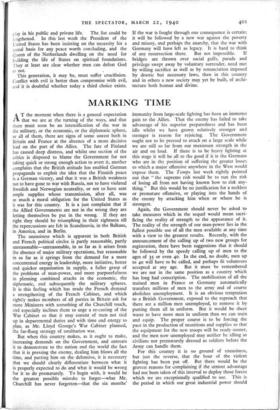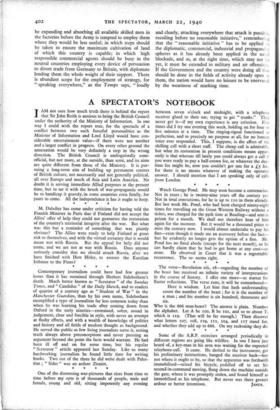MARKING TIME
AT the moment when there is a general expectation that we are at the turning of the ways, and that there must soon be an intensification of the war in
the military, or the economic, or the diplomatic sphere, or all of them, there are signs of some unrest both in Britain and France at the absence of a more decisive lead on the part of the Allies. The fate of Finland has caused deep distress, and whilst one section of the critics is disposed to blame the Government for not taking quick or strong enough action to avert it, another complains that the British attitude has enabled German propaganda to exploit the idea that the Finnish peace is a German victory, and that it was a British weakness not to have gone to war with Russia, not to have violated Swedish and Norwegian neutrality, or not to have sent ample supplies whose transmission, after all, was as much a moral obligation for the United States as it was for this country. It is a just complaint that if the Allied Governments are not in the wrong they are letting themselves be put in the wrong. If they are right they should be triumphing in their rightness till the repercussions are felt in Scandinavia, in the Balkans, in America, and in Berlin.
The uneasiness which is apparent in both British and French political circles is partly reasonable, partly unreasonable—unreasonable, in so far as it arises from the absence of major military operations, but reasonable in so far as it springs from the demand for a more concentrated energy in leadership, more initiative, better and quicker organisation in supply, a fuller grasp of the problems of man-power, and more purposefulness in planning combined attacks in the economic, the diplomatic, and subsequently the military spheres, It is this feeling which has made the French demand a strengthening of the French Cabinet, and which rightly makes members of all parties in Britain ask for more Ministers with something of the Churchill touch, and especially inclines them to urge a re-casting of the War Cabinet so that it may consist of men not tied up in departmental duties and with time and energy to plan, as Mr. Lloyd George's War Cabinet planned, the far-flung strategy of totalitarian war.
But when this country makes, as it ought to make, increasing demands on the Government, and entreats it to demonstrate to the nation and the world the fact that it is pressing the enemy, dealing him blows all the time, and putting him on the defensive, it is necessary that we should clearly differentiate between what it is properly expected to do and what it would be wrong for it to do prematurely. To begin with, it would be the greatest possible mistake to forget—what Mr. Churchill has never forgotten—that the six months' immunity from large-scale fighting has been an immense gain to the Allies. That the enemy has failed to take advantage of his superior preparedness and has been idle whilst we have grown relatively stronger and stronger is reason for rejoicing. The Government ought not to be pressed to attack on a large scale while we are still so far from our maximum strength in the air and on land. If there is to be heavy fighting at this stage it will be all to the good if it is the Germans who are in the position of suffering the greater losses to which a major offensive anywhere in the West would 'expose them. The Temps last week rightly pointed out that " the supreme risk would be to run the risk of losing all from not having known how to risk any- thing." But this would be no justification for a reckless or premature offensive, or playing into the hands of the enemy by attacking him when or where he is strongest.
Again, the Government should never be asked to take measures which in the sequel would mean sacri- ficing the reality of strength to the appearance of it.
The reality of the strength of our man-power lies in the fullest possible use of all the men available at any time with a view to the greatest results. Recently, with the announcement of the calling up of two new groups for registration, there have been suggestions that it should be followed by the speedy calling up of men to the ages of 35 or even 40. In the end, no doubt, men up to 4o will have to be called, and perhaps fit volunteers accepted at any age. But it must be remembered we are not in the same position as a country which has long had conscription. The mobilisation of all the trained men in France or Germany automatically transfers millions of men to the army and of course abolishes unemployment. It is an obvious temptation to a British Government, exposed to the reproach that there are a million men unemployed, to remove it by putting them all in uniform. But it would be sheer waste to have more men in uniform than we can train and equip. The proper course is to be forcing the pace in the production of munitions and supplies so that the equipment for the new troops will be ready sooner, and the men now unemployed may neither be idling as civilians nor prematurely dressed as soldiers before the Army can handle them.
For this country it is no ground of uneasiness, but just the reverse, that the hour of the violent fighting has been put off. But there would be the gravest reasons for complaining if the utmost advantage had not been taken of this interval to deploy those forces which we are exceptionally qualified to use. This is the period in which our great industrial power should be expanding and absorbing all available skilled men in the factories before the Army is tempted to employ them where they would be less useful; in which steps should be taken to ensure the maximum cultivation of land of which this country is capable; in which high responsible commercial agents should be busy in the neutral countries employing every device of persuasion to divert trade from Germany to Britain, with diplomats lending them the whole weight of their support. There is abundant scope for the employment of strategy, for " speaking everywhere," as the Temps says, " loudly and clearly, attacking everywhere that attack is possib■e, recoiling before no reasonable initiative," remembering that the " reasonable initiative " has to be applied in the diplomatic, commercial, industrial and propagandist spheres as it has already been applied in the na,. al blockade, and as, at the right time, which may not 're yet, it must be extended to military and air offensives. If the Government and the country were doing all that should be done in the fields of activity already open .o them, the nation would have no leisure to be enervated by the weariness of marking time.







































 Previous page
Previous page